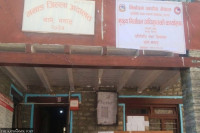Gandaki Province
Unsafe disposal of used lead-acid batteries a concern in Myagdi
The disposal of used lead-acid batteries as regular trash has raised concerns over soil contamination and water pollution.
Ghanashyam Khadka
Disposal of used lead-acid batteries has become a problem in Myagdi. People in the rural parts of the district rely on lead-acid batteries to power their homes and operate machines. Once these batteries expire, their owners throw them away along with their household waste, which has posed environmental and health hazards.
Bhoj Bahadur Thapa, plant protection officer of the Agriculture Knowledge Centre in the district, said unsafe disposal of lead-batteries could cause harmful metals like mercury and cadmium to leak out and contaminate soil and water.
Beside posing environmental and health risks, disposed batteries are also being used to make homemade weapons by some people.
“Lead is extracted from batteries to make bullets for improvised guns used by hunters as well as criminals,” an official at the National Investigation Department said.
Chief District Officer Gyannath Dhakal said concerns regarding the disposal of batteries were unheard of in the past.
“But we have deployed policemen in the villages for surveillance and to create awareness in the communities so that disposed of batteries do not fall into the wrong hands,” Dhakal said. “We are also going to find an effective way for battery waste management.”
There’s no exact data on the number of households that use lead-acid batteries in Myagdi, but it is estimated that more than 10,000 households in Mangala, Malika and Dhaulagiri rural municipalities rely on solar energy to light up their houses and therefore use batteries.
According to Gopal Paudel, a resident of Dhaulagiri, said a 20 Ampere battery contains five litres acid and 10kg lead, 75 Ampere contains 15 litres acid and 50kg lead, and 100 Ampere of battery contains 25 litres acid and 60kg lead.
“In an average, 150,000 litres of acid is being spilt in fertile farmlands, gorges and streams every year,” he said.
Old battery acid is released in open areas before they are disposed of or sold to garbage collectors.
“We cannot carry large batteries to Beni or Pokhara. That’s why we get rid of acid from old batteries since they are lighter and easy to carry,” said Lal Bahadur Sunachauri, a garbage collector in Dhaulagiri. “Many garbage collectors purchase used batteries from the villages and dump acid on farmlands and streams.”
The Environment Protection Rules 1997 has stated the adoption of various alternative measures for controlling pollution and avoiding the emission of waste disposal of battery. But those measures have not been implemented. Usually, solar companies charge fees to manage solar batteries. According to the rule, the companies that sell or distribute batteries are responsible for their disposal.
“The rule also directs the solar companies to take back sold batteries but none of the companies does,” said Thapa.
Nakul Dhakal, the operator of Dhakal Solar House in Beni, said they have not kept the record of the sale of new or return of used batteries.
“I don’t know about the rules and regulations. The garbage collectors are responsible when it comes to the management of used and old batteries,” said Dhakal.
Dr Nawaraj Bastakoti of District Hospital said that acid is very dangerous to human health.
“Acid easily damages soil and also affects vegetation. Acids are also being used to harm people. That’s why the local administration should regulate and monitor the sale of acid. Only licensed companies should be allowed to sell acid after verification,” said Bastakoti.




 9.83°C Kathmandu
9.83°C Kathmandu











